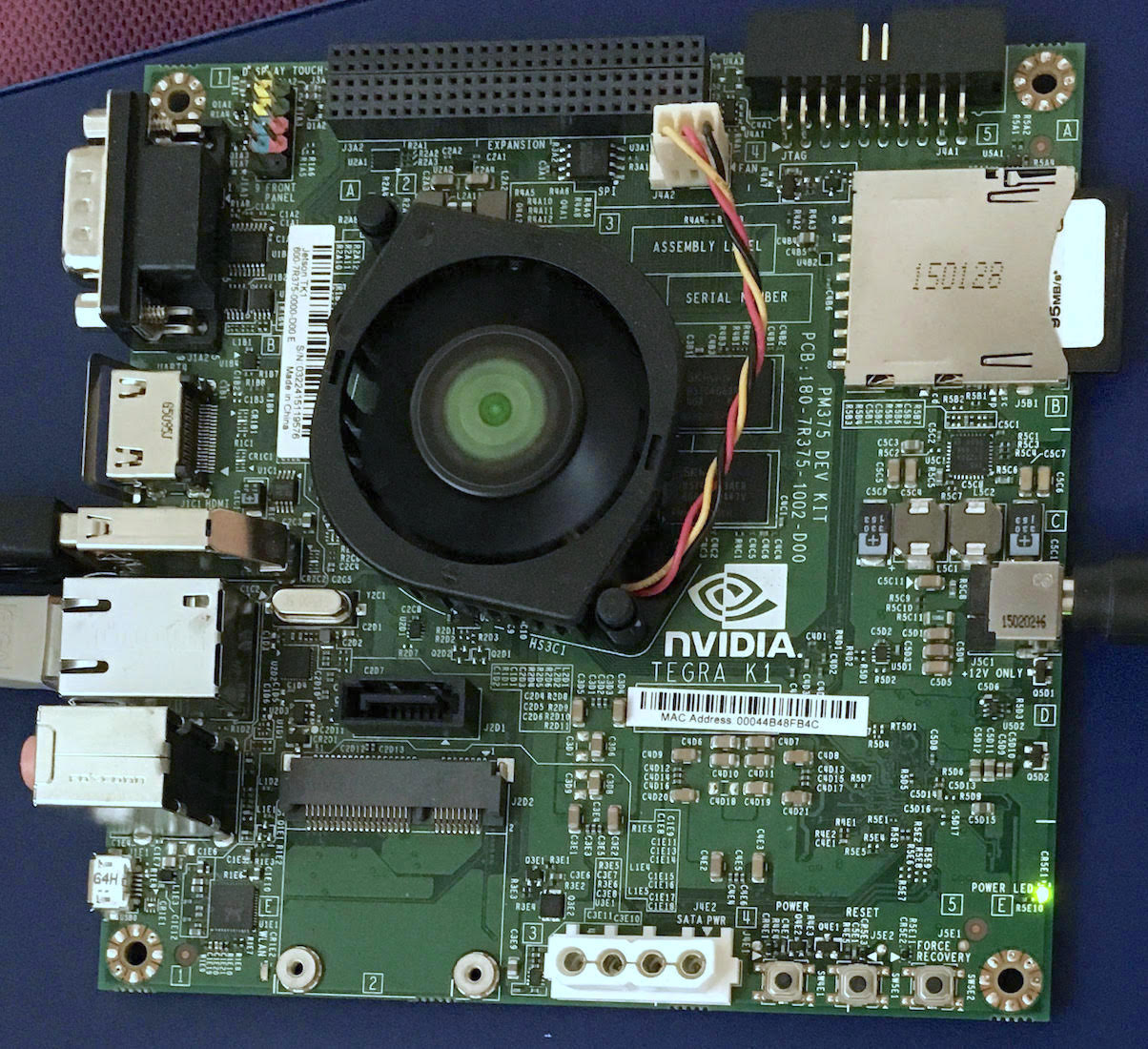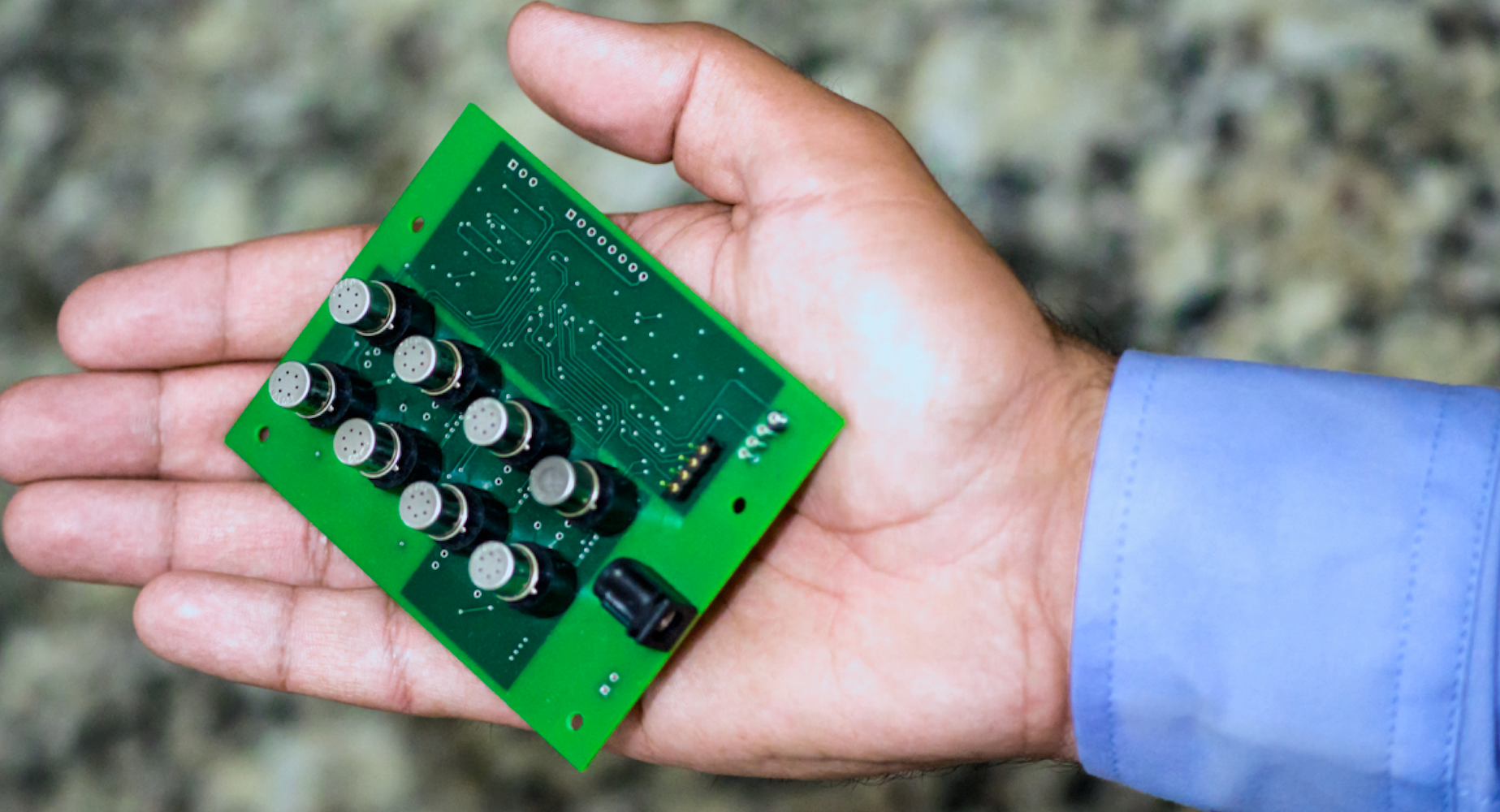Serial port in Nvidia Jetson board on Ubuntu
The Nvidia Jetson is a powerful board that uses the NVIDIA Tegra® technology and NVIDIA Kepler™ computing core. Given the computation power and the relatively low energy consumption, it is a competitive option for developing embedded systems. We wanted to have one of these boards recording from the electronic nose (picture at the end of the post) for two main reasons: easy to change its location and exceptional performance for online computation. The electronic nose uses an FTDI chip to stream the recordings through the USB serial port. Ideally, Linux would mount it in /dev/ttyUSBX (X being 0 in the absence of other serial ports). The problem was that the operating system did not have FTDI drivers by default, and we had to compile them.

BTW thanks to @jaquejbrito for helping me throughout this test.
We are using the Ubuntu version available from Linux For Tegra (R24.2.1), which is maintained by Nvidia. Once the FTDI chip is plugged in, it readily becomes visible:
user@nose:~$ lsusb Bus 002 Device
002: ID 0403:6001 Future Technology Devices International, Ltd FT232 Serial (UART) IC
Still, the operating system did not mount it as a serial port.
user@nose:~$ dmesg | grep tty
[ 0.000000] console [tty1] enabled
[ 1.822624] serial8250.0: ttyS0 at MMIO 0x70006300 (irq = 122) is a Tegra
[ 4.148550] console [ttyS0] enabled
[ 4.154460] serial-tegra.0: ttyTHS0 at MMIO 0x70006000 (irq = 68) is a SERIAL_TEGRA
[ 4.166339] serial-tegra.1: ttyTHS1 at MMIO 0x70006040 (irq = 69) is a SERIAL_TEGRA
[ 4.178319] serial-tegra.2: ttyTHS2 at MMIO 0x70006200 (irq = 78) is a SERIAL_TEGRA
You may try to force mount it, but it will not work. After checking for drivers, we realized that the operating system does not have the drivers for the FTDI converter device set by default.
user@nose:~$ zcat /proc/config.gz | grep FTDI
# CONFIG_USB_SERIAL_FTDI_SIO is not set
# CONFIG_USB_FTDI_ELAN is not set
Thus, to solve this, we will need to compile it from the source.
Compiling FTDI module
Next, I will walk through how we compiled the drivers from source. First, download the kernel source and uncompress it somewhere. In my case, this will be in my home directory.
wget http://developer.download.nvidia.com/embedded/L4T/r21_Release_v4.0/source/kernel_src.tbz2
bzip2 -d kernel_src.tbz2
tar -xvf kernel_src.tar
Make sure you get the right kernel for you. Mine was version 3.10.40. To double
check it, use the uname command:
user@nose:~$:~/kernel# uname -a
Linux tegra-ubuntu 3.10.40-gdacac96 #1 SMP PREEMPT Thu Jun 25 15:25:11 PDT 2015 armv7l armv7l armv7l GNU/Linux
The first time around, I got it wrong, and I lost a good amount of time on it…!
By uncompressing it, you will be creating a new folder called “kernel.”
Next, copy the current kernel config into the folder and run menuconfig.
zcat /proc/config.gz > ~/kernel/.config
cd kernel
make menuconfig
Then, navigate to:
Device Drivers -> USB Support -> USB Serial Converter Support
Mark “M” for Module in the option USB FTDI Single Port Serial Driver. Save it, but do not exit menuconfig yet. Now it is important to check if the CONFIG_LOCALVERSION variable is matching your kernel. If you don’t check this, you may see a message like this at the end:
[ 36.225047] ftdi_sio: version magic '3.10.40 SMP preempt mod_unload ARMv7 p2v8 ' should be '3.10.40-gdacac96 SMP preempt mod_unload ARMv7 p2v8 '
To check if your kernel has a CONFIG_LOCALVERSION set, use the uname
-a command. In the output shown above, the CONFIG_LOCALVERSION was set
to -gdacac96. Thus, we want to append it to the kernel version DURING the
compilation of our module, guaranteeing that the versions of the kernel and the driver match.
Fortunately, we can solve this with menuconfig. Go to the original menu, and
select General Setup->Local Version. A window will open where you can set
up the local version, which sets the variable CONFIG_LOCALVERSION.
Just type in the local conversion, which is what
comes after the date (with dash included!). In my case above, I typed
“-gdacac96”.
Save again and exit the menuconfig. Finally, build the modules (read the
make file).
make prepare
make modules_prepare
make M=drivers/usb/serial/
# copying back the drivers
sudo cp drivers/usb/serial/ftdi_sio.ko /lib/modules/$(uname -r)/kernel
sudo depmod -a
No errors mean everything went smoothly, and you should have the drivers available just fine.
Conclusion and testing the final setup
After that, I rebooted the Jetson board and tried dmesg again:
user@nose:~$ dmesg | grep tty
...
[ 1066.441572] usb 2-1: FTDI USB Serial Device converter now attached to ttyUSB0
As usual, only the root has permission to read/write from/to ttyUSB0 by default, so remember to change it (e.g., to 660 or 666). If you still have problems with permission for reading/writing to the serial port, try adding your user to the dialout group.
usermod -a -G dialout user
I also noticed that the electronic nose (picture below) has to be hooked up when the operating system boots up. Otherwise, your user may not have proper permissions (even after adding it to dialout group). This issue with permissions must be related to when the device is mounted, although I have not figured out exactly why.

At the end of the day, the serial port works perfectly. Its performance is more than reasonable even when using simple parallel processing (click here for the software).